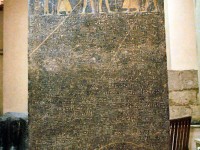I open today with the structure of the text we’re covering. Alma 30-34 are really one unit, which we break up. In the 1830 Book of Mormon, they constitute one chapter, Alma XVI. Presumably, we’re breaking these up because of their doctrinal nature; we want to slow down and spend time on them.
Today we cover Alma 32-34, which looks like thisin the rough big-picture outline.
32– Alma continues preaching at Antionum; “faith sermon” on the hill Onidah.
33– Crowd’s negative response; Alma continues his sermon.
34– Amulek takes over, and preaches to the crowd on the hill.







 These chapters are the violent dénoument of the Ammonihah story. Grant Hardy cogently points out how this story with Alma/Amulek parallels an earlier story with Abinadi.
These chapters are the violent dénoument of the Ammonihah story. Grant Hardy cogently points out how this story with Alma/Amulek parallels an earlier story with Abinadi. 



Recent Comments